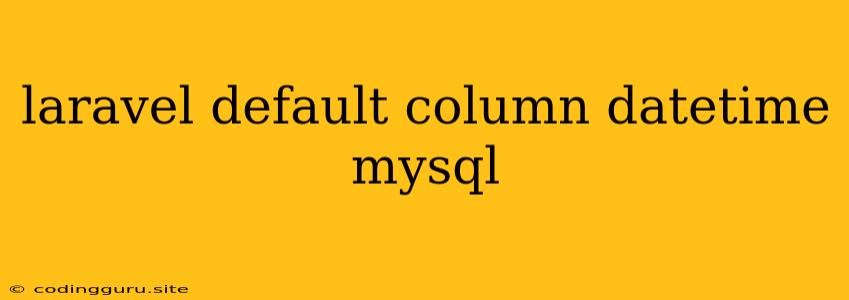Understanding Laravel's Default datetime Column in MySQL
Laravel, the popular PHP framework, offers a streamlined approach to interacting with databases, particularly MySQL. When defining your database schema using Laravel's migration system, you might encounter the datetime column type. This article aims to demystify the datetime column in Laravel and how it interacts with MySQL, answering questions such as:
- What is the
datetimecolumn type? - How does it differ from other date-related column types?
- How can I utilize this column type effectively in my Laravel application?
Let's dive in!
What is the datetime column type?
The datetime column type in MySQL is used to store date and time values. It represents a point in time with a precision of one second. This type is highly valuable for tracking events, timestamps, and other time-sensitive data within your database.
How does the datetime column type work?
The datetime column stores dates and times in a specific format: YYYY-MM-DD HH:MM:SS. This format ensures consistency and compatibility across various systems.
How does Laravel handle the datetime column type?
Laravel provides a convenient way to define and utilize the datetime column in your migrations. Here's an example:
id();
$table->string('title');
$table->text('content');
$table->**datetime**('created_at');
$table->**datetime**('updated_at');
});
}
/**
* Reverse the migrations.
*
* @return void
*/
public function down()
{
Schema::dropIfExists('posts');
}
}
In this example, we define a posts table with a created_at and updated_at column, both utilizing the datetime type. Laravel automatically manages these columns, providing you with timestamps for each record created or updated in the table.
Advantages of using datetime in Laravel:
- Automatic Timestamping: Laravel automatically populates
created_atandupdated_atcolumns when creating or updating database records. This is convenient for logging and tracking changes. - Data Integrity: Using a dedicated
datetimecolumn ensures that your time-based data is stored consistently and accurately in the database. - Ease of Access: Laravel's Eloquent ORM provides simple methods like
created_atandupdated_atto retrieve these values from your models.
Alternatives to datetime:
timestamp: This column type stores a Unix timestamp, which represents the number of seconds elapsed since January 1st, 1970. While more compact, it might not be as user-friendly asdatetime.date: This type stores only the date portion of a date and time value. It's useful if you only need to track the date component.time: This type stores only the time portion of a date and time value. It's useful if you only need to track the time component.
Choosing the right column type:
The best choice depends on your specific needs:
- For tracking events with both dates and times:
datetimeis the most versatile option. - For only storing dates:
dateis suitable. - For only storing times:
timeis the right choice. - For storing a Unix timestamp:
timestampoffers compactness but might not be as user-friendly.
Working with datetime columns in your Laravel application:
Once you have a datetime column in your database, you can interact with it using various Laravel features. For example:
- Retrieve the
created_atvalue:
$post = Post::find(1);
echo $post->created_at; // Output: 2023-12-12 15:30:20
- Modify the
updated_atvalue:
$post = Post::find(1);
$post->update(['title' => 'New Title']); // This will also update the `updated_at` column automatically
- Use Carbon library for enhanced date and time manipulations:
use Carbon\Carbon;
$post = Post::find(1);
echo Carbon::parse($post->created_at)->format('Y-m-d H:i'); // Output: 2023-12-12 15:30
Conclusion
The datetime column type is a valuable asset in Laravel for handling date and time information in your MySQL database. Its automatic timestamps, data integrity, and ease of access make it a highly recommended choice for tracking events, timestamps, and other time-sensitive data within your applications. By understanding how datetime works and utilizing its capabilities effectively, you can enhance your Laravel application's functionality and maintain accurate and consistent data.
